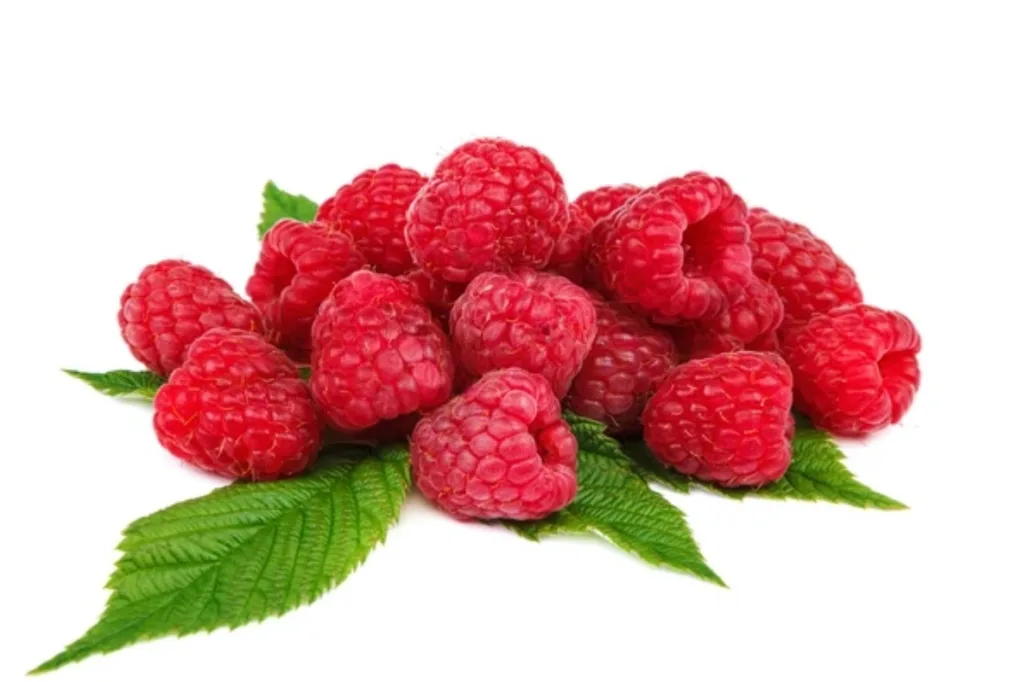What are Raspberries?
Raspberries are not just a delightful treat; they are a powerhouse of nutrients and health benefits. This article delves into the various health advantages and uses of raspberries, providing an informative guide to understanding why this fruit should be a staple in your diet.
Nutritional Profile of Raspberries
Raspberries are packed with essential nutrients. A single cup of raspberries (about 123 grams) contains:
- Calories: 64
- Fiber: 8 grams
- Vitamin C: 54% of the Daily Value (DV)
- Manganese: 41% of the DV
- Vitamin K: 12% of the DV
- Magnesium: 5% of the DV
- Folate: 4% of the DV
These nutrients contribute to the numerous health benefits associated with raspberries.

Health Benefits of Raspberries
1. Antioxidant Powerhouse
Raspberries are rich in antioxidants, including quercetin, ellagic acid, and vitamin C. Antioxidants help neutralize free radicals in the body, reducing oxidative stress and lowering the risk of chronic diseases such as heart disease, diabetes, and cancer.
2. Anti-Inflammatory Properties
The phytonutrients in raspberries, particularly anthocyanins, have strong anti-inflammatory effects. Consuming raspberries regularly can help reduce inflammation in the body, which is linked to conditions like arthritis and cardiovascular diseases.
3. Supports Heart Health
Raspberries contribute to heart health in several ways. Their high fiber content helps lower cholesterol levels, while potassium aids in regulating blood pressure. Additionally, the antioxidants in raspberries help reduce oxidative stress, further protecting the heart.
4. Aids in Weight Management
Raspberries are low in calories and high in fiber, making them an excellent choice for those looking to manage their weight. The fiber in raspberries helps you feel full longer, reducing overall calorie intake.
5. Enhances Digestive Health
The high fiber content in raspberries aids digestion by promoting regular bowel movements and preventing constipation. Fiber also feeds the beneficial bacteria in the gut, contributing to a healthy microbiome.
6. Supports Eye Health
Raspberries contain lutein and zeaxanthin, antioxidants that are beneficial for eye health. These compounds protect the eyes from harmful blue light and reduce the risk of age-related macular degeneration and cataracts.
7. Boosts Immune System
Vitamin C in raspberries plays a crucial role in boosting the immune system. It stimulates the production of white blood cells, which are essential for fighting infections and illnesses.
8. Potential Anti-Cancer Properties
Studies have shown that the ellagic acid in raspberries has anti-cancer properties. It helps slow the growth of cancer cells and may even promote apoptosis, the process of programmed cell death, in certain types of cancer.

Uses of Raspberries
Culinary Uses of Raspberries
Raspberries are incredibly versatile in the kitchen. Here are some popular ways to incorporate them into your diet:
- Smoothies: Blend raspberries with other fruits, yogurt, and a bit of honey for a refreshing and nutritious smoothie.
- Salads: Add fresh raspberries to salads for a burst of color and flavor. They pair well with leafy greens, nuts, and cheese.
- Desserts: Use raspberries in pies, tarts, and cakes. They also make a great topping for ice cream and yogurt.
- Jams and Sauces: Make homemade raspberry jam or sauce to enjoy with bread, pancakes, or as a glaze for meats.
- Beverages: Infuse water with raspberries for a refreshing drink, or use them in cocktails and mocktails.

Medicinal Uses of Raspberries
Raspberries have been used in traditional medicine for centuries. Here are some medicinal uses:
- Digestive Aid: Raspberry leaf tea is known to aid digestion and alleviate gastrointestinal discomfort.
- Menstrual Relief: Raspberry leaf tea is also used to ease menstrual cramps and regulate menstrual cycles.
- Skin Health: The antioxidants in raspberries help protect the skin from damage and promote a healthy complexion.
Cosmetic Uses
The beauty industry has also embraced raspberries for their skin benefits. Raspberry seed oil is rich in essential fatty acids and antioxidants, making it an excellent ingredient for skincare products. It helps moisturize the skin, reduce inflammation, and protect against UV damage.
How to Select and Store Raspberries
When selecting raspberries, look for firm, plump, and brightly colored berries. Avoid those that are mushy or have signs of mold. Raspberries are highly perishable and should be consumed within a few days of purchase. Store them in the refrigerator and wash just before eating to prolong their freshness.
Conclusion
Raspberries are a delicious and nutritious fruit with a plethora of health benefits. From supporting heart health and aiding in weight management to enhancing digestive health and boosting the immune system, the advantages of consuming raspberries are extensive. Their versatility in culinary, medicinal, and cosmetic uses further cements their status as a valuable addition to any diet. By incorporating raspberries into your daily routine, you can enjoy both their delightful taste and their impressive health benefits.
Topics covered
- What are Raspberries?
- What are key nutrients in Raspberries?
- What are health benefits of Raspberries?
- How to use Raspberries?
- Medical uses of Raspberries.








2 thoughts on “Raspberries: A Nutritional Powerhouse with Remarkable Health Benefits”